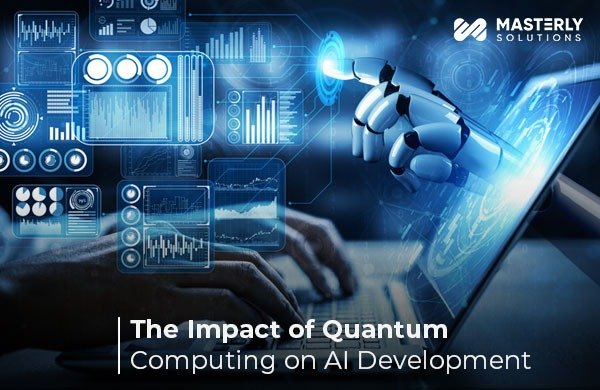
In the rapidly evolving landscape of technology, the confluence of quantum computing and artificial intelligence (AI) is heralding a new era of innovation. As a leading software development company, Masterly Solutions is at the forefront of exploring how this integration can revolutionize industries, drive engagement, and solve complex business problems. This article delves into the transformative potential of quantum computing in AI development, offering insights into future trends and practical applications.
Understanding Quantum Computing and AI
Quantum computing represents a fundamental shift from traditional computing. It leverages the principles of quantum mechanics to process information at speeds unattainable by classical computers. In the realm of AI development, quantum computing’s efficiency in solving intricate algorithms is transformative, paving the way for advanced machine learning models and AI applications.
The Synergy between Quantum Computing and AI
The integration of AI and quantum computing is unlocking new possibilities for data processing and analysis. Quantum algorithms, with their ability to perform calculations at unprecedented speeds, are enhancing AI’s capability to learn and adapt. This synergy is not just theoretical; it’s driving practical innovations across various sectors, including healthcare, financial services, and manufacturing.
Quantum Computing Applications in AI
Quantum Machine Learning
The burgeoning field of quantum machine learning exemplifies the real-world applications of quantum computing within the realm of AI. By harnessing quantum algorithms, machine learning models can process vast datasets more efficiently, leading to more accurate and faster predictions. These implications carry significant weight for industries dependent on extensive data analytics, including digital marketing and financial services.
Quantum Neural Networks
A revolutionary use case emerges with the advancement of quantum neural network development. Utilizing quantum mechanics principles, these networks enhance traditional neural network capabilities, providing a novel solution to previously perceived intractable AI challenges.
The Future of AI with Quantum Computing
Looking ahead, the potential of quantum computing to impact AI development is immense. Quantum AI advancements anticipate transformative strides in drug discovery, climate modeling, and intricate system simulations. Moreover, the fusion of quantum computing with AI promises to establish more secure and efficient communication networks—an imperative factor for the future of digital transactions and cybersecurity.
Challenges and Opportunities
While holding immense promise, the fusion of quantum computing with AI poses notable challenges. In its initial phases, the technology encounters hurdles like hardware stability, quantum error correction, and the requirement for scalable quantum systems, still awaiting comprehensive resolution. However, these challenges also present opportunities for innovation and development, driving investment and research in this exciting field.
Quantum Computing AI Solutions in Gulf Countries and the USA
Recognizing the strategic importance of quantum AI, Masterly Solutions is actively exploring partnerships and opportunities in the Gulf Countries and the USA. We strive to harness our proficiency in Microsoft.NET services, mobile app development, and AI solutions to provide state-of-the-art solutions tailored to meet the distinctive requirements of businesses in these regions.
Conclusion
The impact of quantum computing on AI development represents a frontier of technological innovation. As we continue to explore this exciting synergy, the possibilities for transforming industries, enhancing digital marketing strategies, and solving complex business problems are limitless. At Masterly Solutions, we are committed to driving the future of seamless software experiences, harnessing the power of quantum computing and AI to deliver innovative solutions that meet the evolving needs of our clients.
